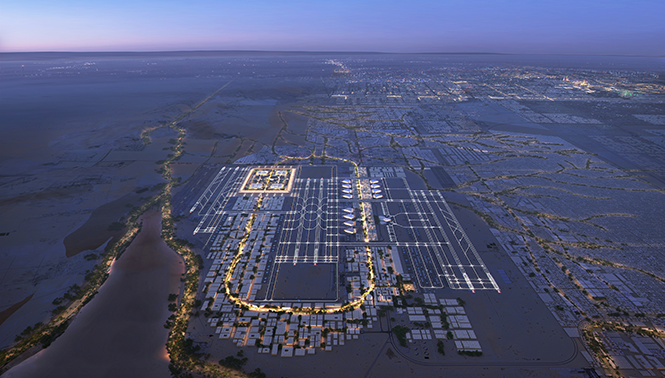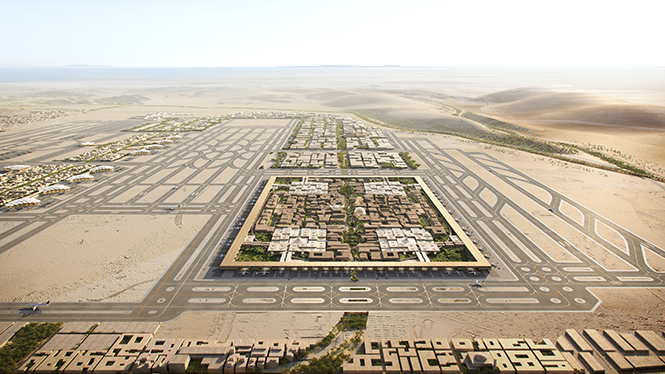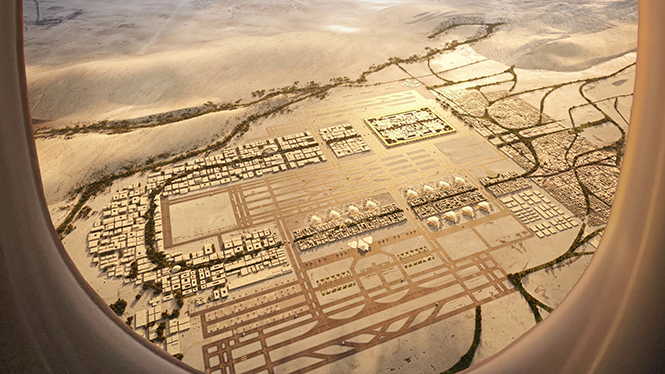





JEDDAH: The under-construction Riyadh-based King Salman International Airport, one of the world’s newest, largest, and most sustainable airports, will be the first thing to impress visitors to the World Expo 2030 that Saudi Arabia has presented a bid to host.
According to the Public Investment Fund, the project, announced by Crown Prince Mohammed bin Salman on Nov. 28, 2022, is expected to cover an area of approximately 57 sq. km, allowing six parallel runways and including the existing terminals named after King Khalid.
PIF added that the airport will also include 12 sq. km of airport support facilities, residential and recreational facilities, retail outlets, and other logistics real estate.
“The airport aims to accommodate up to 120 million travelers by 2030 and 185 million travelers, with the capacity to process 3.5 million tons of cargo, by 2050,” PIF said in its statement.
Saudi Arabia has announced that Riyadh Expo 2030 will be held near KSIA, making the exhibition easily accessible for visitors arriving at the airport. Within minutes, they can reach the exhibition site by using the Riyadh Metro network.
The renewable energy-powered airport, which will include an integrated logistics special zone, will not only be a gateway for the Expo 2030 visitors if Saudi Arabia wins the bid but also to major projects of the capital city such as Riyadh Sports Boulevard, King Salman Park, Diriyah Gate and Qiddiya Amusement Park.
Dr. Abdullah bin Ahmed Al-Maghlouth, member of the Saudi Economic Association, told Arab News that the establishment of KSIA will be Riyadh’s gateway to the world.
“It is an economic project with a double economic value, which will resonate in all cities of the Kingdom, as many research studies have confirmed the close interdependence between the services airports provide and regional development,” he said.
Al-Maghlouth added: “The more passengers, flights and cargo transport, the higher the gross domestic product, wages and incomes become. They encourage the growth of the city, build more hotels and restaurants, provide more services and express transportation to accommodate visitors and tourists.”
Furthermore, he pointed out that Riyadh is a large city witnessing steady growth in business movement and attracting the headquarters of the largest regional companies.
“Riyadh’s population is also expected to exceed 15 million individuals in 2030, and the city has proven its ability to attract visitors and tourists from all over the world as it is home to the largest entertainment festivals globally. KSIA will support the tourism and entertainment sectors and will encourage the opening of more facilities, shops and logistics,” he explained.
The economic expert went on to say that Saudi Arabia also stands to gain financially from the new airport.
“The airport’s revenues are expected to reach nearly SR27 billion [$7.2 billion] per year, which will add to the country’s non-oil economy, as Saudi Arabia seeks through its Vision 2030 to elevate its non-oil income,” Al-Maghlouth said.
He concluded that Riyadh, as an investment destination, is expected to attract more investors and tourists through this airport.
KSIA will help drive annual passenger traffic in Saudi Arabia from the current 29 million to 120 million travelers by 2030 and 185 million by 2050, with aircraft traffic in the Kingdom increasing from 211,000 to more than 1 million flights per year.
With sustainability at its core, the new airport will achieve LEED Platinum certification by incorporating cutting edge green initiatives into its design and will be powered by renewable energy, according to the Saudi Press Agency.
The SPA report added it will become an aerotropolis centered around a seamless customer journey, world-class efficient operations, and innovation.